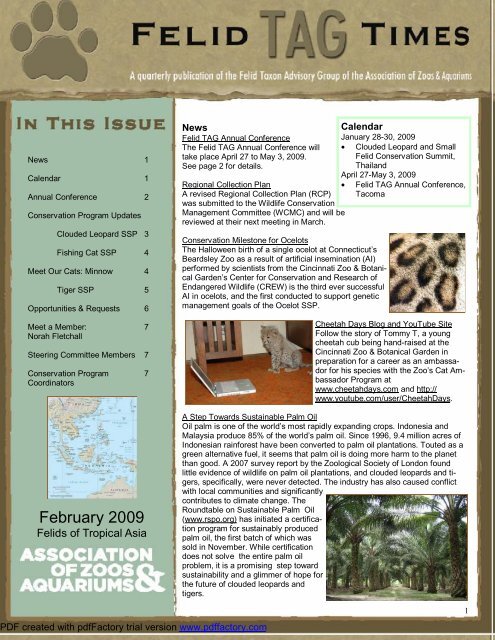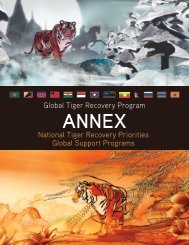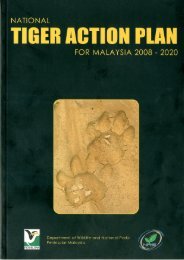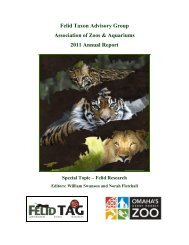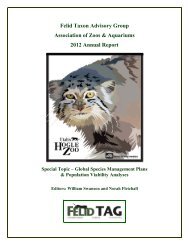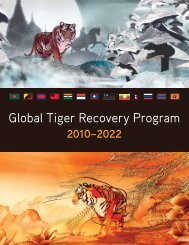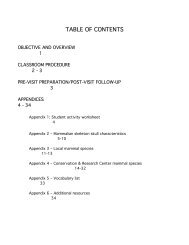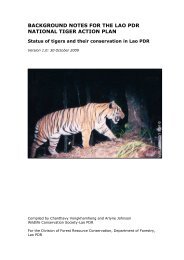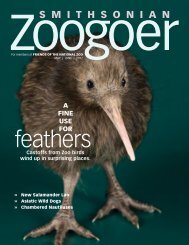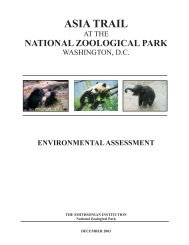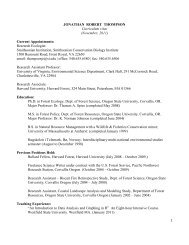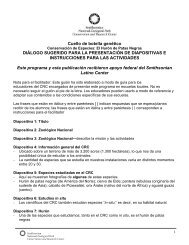February 2009 Newsletter - National Zoo
February 2009 Newsletter - National Zoo
February 2009 Newsletter - National Zoo
Create successful ePaper yourself
Turn your PDF publications into a flip-book with our unique Google optimized e-Paper software.
News 1<br />
Calendar 1<br />
Annual Conference 2<br />
Conservation Program Updates<br />
Clouded Leopard SSP 3<br />
Fishing Cat SSP 4<br />
Meet Our Cats: Minnow 4<br />
Tiger SSP 5<br />
Opportunities & Requests 6<br />
Meet a Member: 7<br />
Norah Fletchall<br />
Steering Committee Members 7<br />
Conservation Program 7<br />
Coordinators<br />
<strong>February</strong> <strong>2009</strong><br />
Felids of Tropical Asia<br />
News<br />
Felid TAG Annual Conference<br />
The Felid TAG Annual Conference will<br />
take place April 27 to May 3, <strong>2009</strong>.<br />
See page 2 for details.<br />
Regional Collection Plan<br />
A revised Regional Collection Plan (RCP)<br />
was submitted to the Wildlife Conservation<br />
Management Committee (WCMC) and will be<br />
reviewed at their next meeting in March.<br />
PDF created with pdfFactory trial version www.pdffactory.com<br />
Conservation Milestone for Ocelots<br />
The Halloween birth of a single ocelot at Connecticut’s<br />
Beardsley <strong>Zoo</strong> as a result of artificial insemination (AI)<br />
performed by scientists from the Cincinnati <strong>Zoo</strong> & Botanical<br />
Garden’s Center for Conservation and Research of<br />
Endangered Wildlife (CREW) is the third ever successful<br />
AI in ocelots, and the first conducted to support genetic<br />
management goals of the Ocelot SSP.<br />
Calendar<br />
January 28-30, <strong>2009</strong><br />
• Clouded Leopard and Small<br />
Felid Conservation Summit,<br />
Thailand<br />
April 27-May 3, <strong>2009</strong><br />
• Felid TAG Annual Conference,<br />
Tacoma<br />
Cheetah Days Blog and YouTube Site<br />
Follow the story of Tommy T, a young<br />
cheetah cub being hand-raised at the<br />
Cincinnati <strong>Zoo</strong> & Botanical Garden in<br />
preparation for a career as an ambassador<br />
for his species with the <strong>Zoo</strong>’s Cat Ambassador<br />
Program at<br />
www.cheetahdays.com and http://<br />
www.youtube.com/user/CheetahDays.<br />
A Step Towards Sustainable Palm Oil<br />
Oil palm is one of the world’s most rapidly expanding crops. Indonesia and<br />
Malaysia produce 85% of the world’s palm oil. Since 1996, 9.4 million acres of<br />
Indonesian rainforest have been converted to palm oil plantations. Touted as a<br />
green alternative fuel, it seems that palm oil is doing more harm to the planet<br />
than good. A 2007 survey report by the <strong>Zoo</strong>logical Society of London found<br />
little evidence of wildlife on palm oil plantations, and clouded leopards and tigers,<br />
specifically, were never detected. The industry has also caused conflict<br />
with local communities and significantly<br />
contributes to climate change. The<br />
Roundtable on Sustainable Palm Oil<br />
(www.rspo.org) has initiated a certification<br />
program for sustainably produced<br />
palm oil, the first batch of which was<br />
sold in November. While certification<br />
does not solve the entire palm oil<br />
problem, it is a promising step toward<br />
sustainability and a glimmer of hope for<br />
the future of clouded leopards and<br />
tigers.<br />
1
Felid TAG Annual Conference<br />
Hosted by the Point Defiance <strong>Zoo</strong> & Aquarium in Tacoma, WA, the <strong>2009</strong> Felid TAG Annual Conference will<br />
be held May 1 through May 3, <strong>2009</strong> (with an Ice Breaker on Thursday, April 30 th ). This year’s meeting will<br />
emphasize two important aspects of felid conservation, Veterinary Medicine and Education, and will include<br />
a variety of presentations and working groups on both subjects. Additional presentations will cover other<br />
aspects of felid conservation, including management, husbandry and scientific research. SSP meetings will<br />
be held prior to the TAG meeting on April 29 and 30. The Felid TAG Husbandry Courses will also be offered<br />
prior to the TAG meeting from April 27 (evening) through April 30, <strong>2009</strong>.<br />
Registration:<br />
$85.00 if received by April 6, <strong>2009</strong>; $95.00 if received later than that date<br />
Download a registration form at www.thezoosociety.org. For further information,<br />
please contact Marla Waddell at marla.waddell@pdza.org, or go to www.felidtag.org<br />
Silent Auction:<br />
Please contribute to the silent auction! Funds raised keep registration fees low, contribute<br />
to travel expenses for invited speakers from felid range countries, and support<br />
in situ conservation efforts. Submit auction items at registration when you<br />
check in or send auction items beforehand to:<br />
Point Defiance <strong>Zoo</strong> & Aquarium, Karen Povey – Felid TAG Auction, 5400 N. Pearl<br />
St., Tacoma, WA 98407<br />
Potential Speakers:<br />
Please contact Bill Swanson, Cincinnati <strong>Zoo</strong>, (513) 569-8227, william.swanson@cincinnatizoo.org by March 1, <strong>2009</strong>.<br />
Husbandry Courses:<br />
Two consecutive Large and Small Cat Husbandry Courses precede the mid-year TAG meeting from April 27 (evening)<br />
through April 30 at Point Defiance <strong>Zoo</strong> & Aquarium. These 2 ½ day courses are designed to assist in the training of keepers,<br />
leads, and front-line supervisors involved in the daily care of felids. Enrollment is limited to 25 participants per course.<br />
The registration fee is $70 for each course ($80 after March 15 th ). For details on the Large Cat Course, please contact Craig<br />
Saffoe at saffoec@si.edu or 202-633-3217, for the Small Cat Course please contact Jillian Fazio at fazioj@si.edu or 202-<br />
633-4381.<br />
Pfaff Memorial Large Felid Husbandry Course Scholarship<br />
In memory of Ashlee Pfaff, Denver <strong>Zoo</strong> Carnivore Keeper who died in a tragic accident at the zoo in 2007, the Denver <strong>Zoo</strong><br />
offers the Pfaff Memorial Large Felid Husbandry Course Scholarship for a felid keeper to attend the <strong>2009</strong> Large Cat Husbandry<br />
Course. Please submit your resume (include experience with large cats) and a letter outlining how you will benefit<br />
from the course, how you feel about the animals you care for, the facility where you work, and felid conservation, and your<br />
career goals as they relate to felid management and conservation. Please limit your response to no more than 500 words.<br />
Letters (Microsoft Word or PDF) must be postmarked or received via email (preferred) no later than January 31, <strong>2009</strong>, and<br />
sent to: Norah Fletchall, Felid TAG Co-Chair, Assistant <strong>Zoo</strong> Director, John Ball <strong>Zoo</strong>logical Garden, 1300 W. Fulton, Grand<br />
Rapids, MI 49504, Norah.fletchall@kenctountymi.gov. The scholarship recipient will be notified by <strong>February</strong> 10, <strong>2009</strong>.<br />
Hotel:<br />
The Inn at Gig Harbor, 3211 56 th St. NW, Gig Harbor, WA 98335. Phone: 253-858-1111. Fax: 253-851-5402<br />
www.innatgigharbor.com.<br />
Rooms are limited so make reservations early. Guaranteed room rate will be held until April 6, <strong>2009</strong>. Room rates: $129.00<br />
for single or double occupancy and $10.00 for each additional person. Call 1-800-795-9980 or 253-858-1111 to reserve a<br />
room and request the special rate for the Felid TAG <strong>2009</strong> Program. If you are looking for a roommate, please post your information<br />
on the FTAG listserv at felidtag@lists.aza.org. If you do not have access to this listserv, you may email your<br />
roommate preference information to Bonnie Breitbeil at bonnieb@centralfloridazoo.org.<br />
Airport transportation:<br />
For those flying into Seattle Tacoma International Airport (SEA), the Kitsap Airporter provides service directly into the Inn at<br />
Gig Harbor. 1.800.562.7948 or www.kitsapairporter.com<br />
Social Events:<br />
The Icebreaker will be held on the evening of Thursday, April 30, with food and refreshments provided.<br />
<strong>Zoo</strong> Day will be held on the afternoon and evening of Saturday, May 2, and will include lunch, behind the<br />
scene tours, a cocktail hour, silent auction, and dinner.<br />
PDF created with pdfFactory trial version www.pdffactory.com<br />
2
Conservation Program Updates<br />
Clouded Leopard SSP—Norah Fletchall<br />
It’s All About the People<br />
As with any other SSP, the Clouded Leopard SSP is about the animal, but the<br />
people are the key to success. Below are some of the key players.<br />
Karen Povey of the Point Defiance <strong>Zoo</strong> leads a group of dedicated, passionate<br />
educators to raise awareness about the clouded leopard both within the<br />
zoo world and with visitors and children who live in areas where clouded leopards<br />
are found. See below for an update on the Clouded Leopard Project.<br />
Drs. Jo Gayle Howard and Katey Pelican lead a team of scientists that are<br />
developing a protocol that will one day hopefully achieve reproducible results<br />
in artificial insemination. In an effort to maintain and promote genetic diversity,<br />
well established breeding pairs were split up to avoid overrepresentation of<br />
some genetic lines. Creating new pairs has been a challenge due to severe<br />
aggression between the animals. Assisted reproduction will allow us to capture valuable genetic material without putting females<br />
at risk during introductions.<br />
Rick Passaro manages an ex-situ breeding program at the Khaow Kheow <strong>Zoo</strong> as part of the Thailand Clouded Leopard<br />
Consortium (<strong>National</strong> <strong>Zoo</strong>, Nashville <strong>Zoo</strong>, Thailand <strong>Zoo</strong>logical Parks Organization, Clouded Leopard SSP). This breeding<br />
program has produced numerous offspring, some of which have been imported into the United States. This new founder<br />
stock is critical for the long term success and maintenance of clouded leopards in AZA member zoos. Rick personifies dedication.<br />
He is on call 24/7 and has only taken a couple of very brief vacations in years (and no days off).<br />
Dr. Andreas Wilting and his colleagues have identified a new species of clouded leopard through field research. Field conservationists<br />
have studied clouded leopards in the wild for decades, yet only recently have we begun to learn about its behavior<br />
through radio collaring and tracking.<br />
Clouded Leopard Project Leaps Ahead<br />
The Clouded Leopard Project (CLP) was founded in 2000 as an initiative of the<br />
Point Defiance Chapter of the American Association of <strong>Zoo</strong> Keepers (AAZK).<br />
The AAZK Chapter served as the CLP’s fiscal sponsor, allowing the organization<br />
to reside under its non-profit umbrella. During this time, the CLP established<br />
its website, initiated merchandising and other fundraising efforts, provided<br />
support for clouded leopard field research, and partnered with Point Defiance<br />
<strong>Zoo</strong> & Aquarium to develop educational materials for use in clouded leopard<br />
range countries.<br />
These activities have allowed the CLP to make ever-increasing contributions to<br />
clouded leopard conservation. Ultimately, however, to move the organization<br />
forward, CLP Committee members decided to undertake incorporation and<br />
gain independent non-profit status. On March 27, 2008 the Clouded Leopard<br />
Project was conferred 501 (c) (3) status as an IRS tax-exempt organization.<br />
The Clouded Leopard Project has several goals, including the advancement of awareness of this little known and endangered<br />
species. Awareness efforts are aimed at global audiences through special events, publications, and the CLP website<br />
and blog at www.cloudedleopard.org. The website also serves as the official website for the Clouded Leopard SSP. CLP<br />
also undertakes numerous fundraising efforts, including online merchandise sales, to raise funds to support field research<br />
on behalf of clouded leopards and other sympatric felids.<br />
PDF created with pdfFactory trial version www.pdffactory.com<br />
The first major conservation effort of the CLP since incorporation is the coordination<br />
of a Clouded Leopard and Small Felid Conservation Summit in Bangkok with Point<br />
Defiance <strong>Zoo</strong> & Aquarium and Smithsonian’s <strong>National</strong> <strong>Zoo</strong> from January 28 to 30,<br />
<strong>2009</strong>. The three-day workshop brings together various stakeholders in Southeast<br />
Asia to identify key issues relating to research, trade, and community education, and<br />
create strategies for future collaborative efforts to benefit clouded leopard and small<br />
felid conservation. Members of the CLP Board of Directors are looking forward to<br />
applying outcomes of this meeting to directing the future of the organization’s contribution<br />
to clouded leopard conservation.<br />
3
Fishing Cat SSP—Bill Swanson<br />
Caught on Film<br />
Camera trapping has confirmed the presence of wild fishing cats in a second<br />
location in southern Thailand. In January <strong>2009</strong>, Thai biologist and<br />
University of Minnesota graduate student Namfon Cutter obtained both<br />
infrared video footage and still photos (above) of at least four fishing cats<br />
in Sam Roi Yot <strong>National</strong> Park, located on the Gulf of Thailand about 200<br />
km south of Bangkok. Working in collaboration with the <strong>National</strong> Park,<br />
Namfon will be attempting to capture several of these fishing cats in the<br />
next several weeks for placement of radiocollars and ecological monitoring.<br />
Funding for this project has been provided by the Fishing Cat SSP<br />
and several AZA institutions. <strong>Zoo</strong>s interested in learning more about the<br />
study and possibly providing financial support should contact Bill Swanson.<br />
Bladder Cancer<br />
Transitional cell carcinoma is a tumor commonly found in the bladder, and<br />
has been found in 15 fishing cats over the last 10 years. The most common<br />
clinical signs include blood in the urine and straining to urinate.<br />
Treatment usually consists of surgically removing as much of the tumor<br />
as possible and treatment with piroxicam, an anti-inflammatory medication<br />
shown to have anti-tumor properties. Recently, the Felid TAG formed<br />
a Bladder Cancer Working Group aimed at gaining a better understanding<br />
of the cause of the disease, how to prevent it, how to detect it early, and<br />
the best way to treat it. An Action Plan that addresses four main aspects<br />
of the disease—epidemiology/risk factors, diagnostics, veterinary therapy,<br />
and dietary issues—was distributed at the end of 2008. One of the primary<br />
objectives in <strong>2009</strong> will be to begin opportunistic collection and freezing<br />
of blood and urine samples from as many fishing cats as possible in<br />
the captive population. A detailed sampling protocol will be distributed to<br />
SSP institutions and other fishing cat facilities by <strong>February</strong> <strong>2009</strong>. If you<br />
would like to receive an electronic copy of the Action Plan or have any<br />
other questions about bladder cancer in this species, you may contact<br />
Bill Swanson at william.swanson@cincinnatizoo.org or Kristi Fisher, Fishing<br />
Cat SSP Vet Advisor, at purrdoc@cox.net.<br />
Meow, or maaeo, is the Thai word for cat.<br />
Need a Fishing Cat SSP Coordinator<br />
Bill Swanson will be stepping down from his role as Program Coordinator<br />
for the Fishing Cat SSP to focus more attention on the Felid TAG and<br />
investigating health and reproductive issues in small felids. The Felid<br />
TAG would like to thank Bill for his seven years of service and dedication<br />
to the Fishing Cat SSP. Bill will remain in his role as Felid TAG Co-chair.<br />
Persons interested in filling the Fishing Cat SSP Coordinator position<br />
should submit their application to Dino Ferri at ferrid@jacksonvillezoo.org<br />
by <strong>February</strong> 15, <strong>2009</strong>.<br />
PDF created with pdfFactory trial version www.pdffactory.com<br />
Meet Our Cats: Minnow<br />
Meet Minnow, the Cincinnati <strong>Zoo</strong> & Botanical<br />
Garden’s star fishing cat. Born in 2003<br />
at the Exotic Feline Breeding Compound,<br />
Minnow moved to the Midwest to join the<br />
<strong>Zoo</strong>’s Cat Ambassador Program later that<br />
year.<br />
Minnow had her official début in the <strong>Zoo</strong>’s<br />
Cheetah Encounter show this past summer.<br />
She shows off her expert water skills as she<br />
dives into a pond to chase after fish. In her<br />
leisure time, Minnow enjoys long walks on<br />
the beach and a candlelit seafood supper.<br />
4
Tiger SSP Update—Ron Tilson<br />
As of July 2008, there were 368 tigers in North American accredited zoos (Figure<br />
1). The Tiger SSP manages three tiger subspecies (Amur: Panthera tigris altaica,<br />
Sumatran: P. t. sumatrae, and Malayan: P. t. jacksoni) but does not manage the<br />
substantial population of generic tigers. Breeding recommendations produced 13<br />
Amur, 3 Sumatran, and 6 Malayan tiger cubs in the year leading up to the July<br />
meeting.<br />
Each of the three managed subspecies populations are managed to maximize the<br />
retention of 90% gene diversity over a 100-year period. The 2008 Felid TAG’s<br />
space survey suggests there are 396 spaces available for tigers currently and 357<br />
in the future. However, each of the three managed subspecies has a target population<br />
of 150, necessitating a total of 450 tiger spaces. That translates to a deficit of<br />
54 tiger spaces now and 93 in the future. In addition, generic tigers take up 103<br />
spaces.<br />
The space dilemma mandates that more space be created (an impossible scenario) or the Tiger SSP be reduced in size to fit<br />
the available space. Thus, the only option available may be to decide which of the two tropical subspecies to keep and which<br />
to phase out. A list of pros/cons for keeping Malayan vs. Sumatran tigers was compiled and discussed at the July meeting. In<br />
the end, the management committee decided to wait until new imports for either subspecies are certain before making a decision<br />
to phase out either of them.<br />
Amur Tiger Update<br />
The Amur tiger population in North American zoos has remained stable over the past decade (current managed SSP population<br />
is 142 individuals) but the success of breeding recommendations has declined. This is in part due to breeding recommendations<br />
made late in the year that often result in a late or missed spring breeding introduction. This issue will be reconsidered<br />
by the management committee.<br />
Twelve Amur tiger breeding recommendations were rolled over from the previous year and 13 new ones were approved.<br />
Eight transfer recommendations not associated with breeding were approved. One male tiger should be sent to Calgary <strong>Zoo</strong><br />
(AZA accredited) for breeding.<br />
Sumatran Tiger Update<br />
The Sumatran tiger population has shown relatively slow growth over the last 15 years and stands at 73 individuals. Four<br />
breeding recommendations from the previous year were rolled over and one new breeding recommendation was approved.<br />
Seven new transfers for non-breeding purposes were approved and the management committee agreed to pursue the export<br />
of three Sumatran tigers to Japan in response to a request from the Japanese Association of <strong>Zoo</strong>s and Aquariums (JAZA)<br />
tiger program.<br />
Malayan Tiger Update<br />
The Malayan tiger population has grown slightly from last year to 50 individuals.<br />
Three breeding recommendations from the previous year were rolled over and three new breeding recommendations were<br />
approved.<br />
PDF created with pdfFactory trial version www.pdffactory.com<br />
The Tiger SSP has proposed to the Malaysian Department of Wildlife<br />
and <strong>National</strong> Parks (DWNP) that we develop a long-term relationship<br />
whereby certain pairs of wild or otherwise genetically unrepresented<br />
tigers kept at the Melaka <strong>Zoo</strong> be bred to produce young tigers for<br />
transfer to AZA zoos within the U.S. In exchange, each AZA-member<br />
zoo receiving a pair of tigers would provide the Malaysian DWNP with<br />
in-situ enhancement support for the department’s wild tiger management<br />
programs such as anti-poaching support, radio-collaring and<br />
tracking efforts, livestock depredation re-imbursement, or other suitable<br />
programs. This cooperative exchange program would extend for<br />
five (5) years, with the potential for another five (5) years if desired by<br />
both the Malaysian DWNP and the Tiger SSP. A proposal was drafted<br />
and sent to DWNP Director General Rasid for study in September.<br />
We are waiting to hear back from him. (Photo: David Jenike)<br />
5
New Requirements for Obtaining a Breeding Recommendation<br />
A tentative list of requirements that zoos must meet in order to obtain a tiger breeding recommendation<br />
has been put forward. Briefly, these are that the zoo must: 1) be an AZA-accredited institution or<br />
have been approved for nonmember status; 2) have a minimum of four dedicated holding spaces for<br />
separating adult male and female tigers and male and female cubs; and preferably two separate outdoor<br />
exhibits for better rotation sequence; 3) have the ability to hold offspring for up to three years<br />
(younger cubs may be transferred); 4) install remote video monitoring of the female during and after<br />
pregnancy; 5) collect fecal samples from the female and perform hormonal analyses (protocol already<br />
developed); and 6) have a hand-rearing protocol (already developed) and milk replacement<br />
formula on hand. These recommendations will be drafted and submitted for approval by the SSP<br />
management committee, and installed as a requirement for next year’s breeding recommendations.<br />
(Photo: David Jenike)<br />
Non-AZA <strong>Zoo</strong>s Must Apply for Nonmember Participating Status<br />
The Amur tiger breeding and transfer plan submitted to AZA by the Tiger SSP in 2008 was<br />
rejected at first because it contained non-AZA accredited institutions. These were largely<br />
CAZA-accredited zoos in Canada that had been participating for years in the Tiger SSP.<br />
These zoos were removed from the plan so that it could be approved and the recommended<br />
transfers and breeding recommendations could proceed. The AZA has made it<br />
clear that these non-AZA-accredited zoos must apply for and receive non-member participating<br />
status before being included in the SSP in the future. Thus far, Edmonton Valley<br />
<strong>Zoo</strong> (Alberta, Canada) submitted an application and the Tiger SSP sent a letter of support.<br />
Opportunities & Requests<br />
Steering Committee Elections<br />
The Felid TAG will be holding elections for five Steering Committee (SC) positions that have expired. These SC positions<br />
will stand for a three-year term. If you are interested in running for election please notify the FTAG Secretary, Bonnie Breitbeil,<br />
at bonnieb@centralfloridazoo.org by <strong>February</strong> 6, <strong>2009</strong>. We also ask that each candidate submit a brief biography describing<br />
their professional background and experience in the zoo field. This can include your expertise with felids or involvement<br />
with the FTAG or any other AZA programs. Please limit your bio to 200 words or less. Ballots and bios will be sent out<br />
via email to FTAG Institutional Representatives (IR) for a <strong>February</strong> election. Notice only current FTAG IRs may stand for<br />
election and/or vote in the election.<br />
Felid Tag Annual Conference<br />
Come to the conference! Take a husbandry course! Donate to the Silent Auction! See page 2 for details.<br />
Need a Fishing Cat SSP Coordinator<br />
Bill Swanson will be stepping down from his role as Program Coordinator for the Fishing Cat SSP to focus more attention on<br />
the Felid TAG and investigating health and reproductive issues in small felids. Persons interested in filling the Fishing Cat<br />
SSP Coordinator position should submit their application to Dino Ferri at ferrid@jacksonvillezoo.org by <strong>February</strong> 15, <strong>2009</strong>.<br />
PDF created with pdfFactory trial version www.pdffactory.com<br />
6
Meet Our Members—Norah Fletchall<br />
Starting out as a keeper at the St. Louis <strong>Zoo</strong>, Norah Fletchall is now the Assistant<br />
Director of the John Ball <strong>Zoo</strong> in Michigan. Although she professes to be “an ungulate<br />
nut at heart”, Norah got hooked on felids, clouded leopards in particular, after<br />
attending a Felid TAG meeting in the early 1990s and has been working with the<br />
Felid TAG for more than 15 years. She is currently the Felid TAG Co-chair and<br />
the Clouded Leopard SSP Coordinator and International Studbook Keeper. Norah<br />
is interested in animal management issues and training the next generation of<br />
felid management experts.<br />
“To me it’s figuring out what is best for the animal—not what we think is best for<br />
the animal.<br />
Working in a zoo setting is a dream come true. Working with zoo people is what keeps me going.<br />
I have always been so impressed by Felid TAG people’s abilities to have heated discussions, work horribly long hours well<br />
into the night at TAG meetings, and then get up and do it all again the next day. Oh, and we do a pretty good party along the<br />
way!<br />
I encourage all of you to get involved in the Felid TAG (or whatever AZA TAG or program sparks your interest). Come to the<br />
Felid TAG mid-year meeting, take the husbandry course, and volunteer for a project (and follow through with your assignments).<br />
We may all be a bit quirky—but trust me we get stuff done and we welcome all to participate!!”<br />
Felid TAG Steering Committee Members<br />
Alan Sironen als@clevelandmetroparks.com<br />
Bonnie Breitbeil bonnieb@centralfloridazoo.org<br />
Danny Morris dannym@omahazoo.com<br />
Don Goff dgoff@beardsleyzoo.org<br />
Dusty Lombardi dusty.lombardi@columbuszoo.org<br />
Hollie Colahan hcolahan@houstonzoo.org<br />
Karen Goodrowe Kareng@tacomaparks.com<br />
Kelley Snodgrass kelleys@fossilrim.org<br />
Ken Kaemmerer Kenneth.Kaemmerer@dallascityhall.com<br />
Kim Davidson Kdavidson@hoglezoo.org<br />
Norah Fletchall Norah.Fletchall@kentcountymi.gov<br />
Ron Tilson Rtilson@mail.mnzoo.state.mn.us<br />
Steve Bircher bircher@stlzoo.org<br />
Tarren Wagener twagener@fortworthzoo.org<br />
William Swanson william.swanson@cincinnatizoo.org<br />
Conservation Program Coordinators<br />
Barb Palmer BarbaraP@sfzoo.org Caracal PMP<br />
Bill Swanson william.swanson@cincinnatizoo.org Fishing cat SSP<br />
Bonnie Breitbeil bonnieb@centralfloridazoo.org Serval PMP<br />
Diana Weinhardt diana.weinhardt@state.mn.us Amur leopard PMP<br />
Don Goff dgoff@beardsleyzoo.org Canada lynx PMP<br />
Hollie Colahan hcolahan@houstonzoo.org Lion SSP<br />
Jack Grisham grisham@stlzoo.org Cheetah SSP<br />
Jay Tetzloff jtetzloff@gpzoo.org Snow leopard SSP<br />
Kara Akers kakers@livingdesert.org Sand cat SSP<br />
Ken Kaemmerer Kenneth.Kaemmerer@dallascityhall.com Ocelot SSP<br />
Martha Caron marthacaron@zmee.net Pallas’ cat SSP<br />
Michelle Schireman pumacoug@aol.com Puma PMP<br />
Norah Fletchall Norah.Fletchall@kentcountymi.gov Clouded leopard SSP<br />
Ron Tilson Rtilson@mail.mnzoo.state.mn.us Tiger SSP<br />
Stacey Johnson sjohnson@lvzoo.org Jaguar SSP<br />
Steve Wing steven.wing@louisvilleky.gov Black-footed cat SSP<br />
Submissions<br />
Felid TAG Times is edited by Shasta Bray, Felid TAG Education Co-Liaison. Please send comments, suggestions, and<br />
submissions to Shasta.bray@cincinnatizoo.org. Submission deadline for the May <strong>2009</strong> newsletter, highlighting Felids of<br />
Temperate Asia, is April 1. 7<br />
PDF created with pdfFactory trial version www.pdffactory.com


